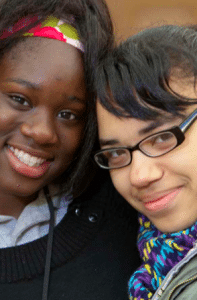Traveling A Longer Road
CompetencyWorks Blog

The authors of Making Mastery Work open a fascinating door into the dynamics of competency education in Chapter 5: How Students Experience Competency Education. In talking with students and teachers across the ten schools with a high degree of diversity – rural/urban; district/charter; 4 year high school/alternative high school serving over-age, undercredited students – a number of important issues emerge.
Traveling a Longer Road: The driving force behind competency education in the K-12 system is equity. We know we need to find a better way than the time-based, A-F system that reproduces inequity. However, the way we think about equity in the traditional system doesn’t really make sense in a competency education system. Making Mastery Work starts to unpack equity in discussing how students in the same classroom may have different ways to show evidence of their learning based on their learning progression. “Equity comes in the fact that both students are stretching themselves as they work towards the same learning target.” What’s interesting in many of the conversations about personalized learning is that students understand the variation in their work if, and only if, the competencies and assessments are perceived as fairly implemented.
Trust: In a post-visit to Maine blog, I wrote about the power of the “growth mindset.” I think that it is this shared belief that we can all learn and that we are all supporting each other in learning that brings to life the trust and sense of all being in it together that is described in Making Mastery Work: MSAD15 students talk about working with their teachers to make competency education work, expressing appreciation for teachers who are open to their suggestions and invite them to make decisions. Four middle school students explained that “We unpack the standards” and then determine the best way to group themselves for a particular activity or recommend particular structures to organize learning more effectively. Teachers emphasized how they trust their students “to help us figure out what works best for them.” “My students usually come up with some great ideas,” said one, “so I trust them.”
Persevering Schools or Schools with Grit: It’s clear that Monique, Kiara, and Luis, students at Boston Day and Evening Academy have grit and perseverance. It’s also clear that BDEA has it as well, designing whatever-it-takes flexibility into the school. Monique had to take one module three times to finally gain proficiency; Luis in his rapid road to a diploma requires rescheduling of his courses every two weeks; and, Kiara’s coming and going requires staff to stick with her so she “can pick up where she left off, moving herself forward.” I’ve heard this type of perseverance in large, 4-year high schools as well. During my site visit to Hall-Dale High School in Maine, I asked Matt Shea from Hall-Dale High School what they do if a student isn’t really college and career-ready. There was no hesitation in his answer, “We invite them back for another year.”
—-
In reading this section I found myself asking if there is something inherent in competency education that brings out the best of us – that generates respect, sparks trust, and empowers us to think creatively about how we use time and other resources. Is there something about competency education that is so nourishing that a culture of whatever-it-takes just starts to blossom? Could it be as simple as focusing on learning rather than the delivery of instruction in righting an education system that has been so off-kilter for so long?